Five Film Favorites on the Edge of the Top Ten
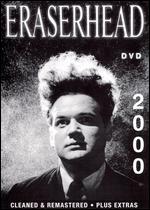 Eraserhead
EraserheadPN1997 .E73 2002
Filmed intermittently over the course of a five-year period, David Lynch's radical feature debut stars Jack Nance as Henry Spencer, a man living in an unnamed industrial wasteland. Upon learning that a past romance has resulted in an impending pregnancy, Henry agrees to wed mother-to-be Mary (Charlotte Stewart) and moves her into his tiny, squalid flat. Their baby is born hideously mutated, a strange, reptilian creature whose piercing cries never cease. Mary soon flees in horror and disgust, leaving Henry to fall prey to the seduction of the girl across the hall (Judith Anna Roberts). An intensely visceral nightmare, Eraserhead marches to the beat of its own slow, surreal rhythm: Henry's world is a cancerous dreamscape, a place where sins manifest themselves as bizarre creatures and worlds exist within worlds. Interpreting the film along the lines of Lynch's claims that it's the product of his own fears of fatherhood may make Eraserhead easier to digest on a narrative level, if need be. ~Jason Ankeny, All Movie Guide
Watch the trailer
Take a look at the following Web sites:
The Official David Lynch Site
The Eraserhead Wikipedia Entry
The City of Absurdity
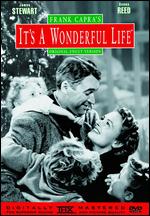
It's a Wonderful Life
PN1997 .I87 1995
PN1997 .I87 1995
This is director Frank Capra's classic bittersweet comedy/drama about George Bailey (James Stewart), the eternally-in-debt guiding force of a bank in the typical American small town of Bedford Falls. As the film opens, it's Christmas Eve, 1946, and George, who has long considered himself a failure, faces financial ruin and arrest and is seriously contemplating suicide. High above Bedford Falls, two celestial voices discuss Bailey's dilemma and decide to send down eternally bumbling angel Clarence Oddbody (Henry Travers), who after 200 years has yet to earn his wings, to help George out. But first, Clarence is given a crash course on George's life, and the multitude of selfless acts he has performed: rescuing his younger brother from drowning, losing the hearing in his left ear in the process; enduring a beating rather than allow a grieving druggist (H.B. Warner) to deliver poison by mistake to an ailing child; foregoing college and a long-planned trip to Europe to keep the Bailey Building and Loan from letting its Depression-era customers down; and, most important, preventing town despot Potter (Lionel Barrymore) from taking over Bedford Mills and reducing its inhabitants to penury. Along the way, George has married his childhood sweetheart Mary (Donna Reed), who has stuck by him through thick and thin. But even the love of Mary and his children are insufficient when George, faced with an $8000 shortage in his books, becomes a likely candidate for prison thanks to the vengeful Potter. Bitterly, George declares that he wishes that he had never been born, and Clarence, hoping to teach George a lesson, shows him how different life would have been had he in fact never been born. After a nightmarish odyssey through a George Bailey-less Bedford Falls (now a glorified slum called Potterville), wherein none of his friends or family recognize him, George is made to realize how many lives he has touched, and helped, through his existence; and, just as Clarence had planned, George awakens to the fact that, despite all its deprivations, he has truly had a wonderful life. Capra's first production through his newly-formed Liberty Films, It's a Wonderful Life lost money in its original run, when it was percieved as a fairly downbeat view of small-town life. Only after it lapsed into the public domain in 1973 and became a Christmastime TV perennial did it don the mantle of a holiday classic. ~Hal Erickson, All Movie Guide
Watch the trailer:
Listen to a jazzy rendition of Auld Lang Syne:
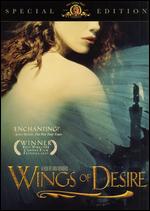 Wings of Desire
Wings of DesirePN1997 .W563 2003
Damiel (Bruno Ganz) and Cassiel (Otto Sander) are angels who watch over the city of Berlin. They don't have harps or wings (well, they usually don't have wings) and they prefer overcoats to gossamer gowns. But they can travel unseen through the city, listening to people's thoughts, watching their actions and studying their lives. While they can make their presence felt in small ways, only children and other angels can see them. They spend their days serenely observing, unable to interact with people, and they feel neither pain nor joy. One day, Damiel finds his way into a circus and sees Marion (Solveig Dommartin), a high-wire artist, practicing her act; he is immediately smitten. After the owners of the circus tell the company that the show is out of money and must disband, Marion sinks into a funk, shuffling back to her trailer to ponder what to do next. As he watches her, Damiel makes a decision: he wants to be human, and he wants to be with Marion, to lift her spirits and, if need be, to share her pain. Wim Wenders' Wings of Desire is a remarkable modern fairy tale about the nature of being alive. The angels witness the gamut of human emotions, and they experience the luxury of simple pleasures (even a cup of coffee and a cigarette) as ones who've never known them. From the angels' viewpoint, Berlin is seen in gorgeous black-and-white — strikingly beautiful but unreal; when they join the humans, the image shifts to rough but natural-looking color, and the waltz-like grace of the angels' drift through the city changes to a harsher rhythm. Peter Falk appears as himself, revealing a secret that we may not have known about the man who played Columbo, and there's also a brief but powerful appearance by Nick Cave & the Bad Seeds. Wings of Desire hinges on the intangible and elusive, and it builds something beautiful from those qualities. ~Mark Deming, All Movie Guide
Watch the trailer
Preview the entire film:
Wings of Desire Part 1 of 2
Wings of Desire Part 2 of 2
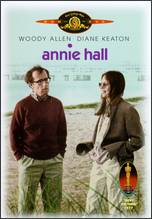
Annie Hall
PN1997 .A47 1991
PN1997 .A47 1991
One of the greatest pleasures of Woody Allen's early work is his ability to skewer himself while skewering the conventions of the comedy genre. Annie Hall is perhaps the best example of this: a blend of slapstick, fantasy, and bittersweet romantic comedy, it is not so much about two people falling in love as about two brains trying to negotiate a mutually beneficial symbiotic relationship. The neurotic, self-obsessed commentary on display in Annie Hall is pointed but relatively gentle, free of the bitterness that sometimes marked Allen's later work. The film is a series of insightful musings that leave the viewer feeling strangely optimistic—or at least very amused—about human nature. Much of this is due to Alvy and Annie themselves—unlike the oddly but perfectly matched couples fated to walk off into the sunset in the majority of romantic comedies, Alvy and Annie are consigned to further introspection, obsessive analysis, and bittersweet reflection. Part of the appeal of Annie Hall is that there are no pat answers: in watching the struggles of the characters, we see a reflection of our own struggles, without the condescending message that everything will be fine in the end. Annie Hall elevated Allen to the forefront of contemporary filmmakers, promoting him from a comedian who happened to make films to a comic filmmaker. The film also set a new standard for romantic comedies, its name alone becoming synonymous with the sub-genre of the intelligent, New York-based romantic comedy. On a less far-reaching scale, it also launched a fashion trend, with Diane Keaton's baggy menswear providing a welcome alternative to polyester pantsuits and flared trousers, anticipating the craze for androgynous clothing by almost twenty years. ~Rebecca Flint Marx, All Movie Guide
Watch the trailer:
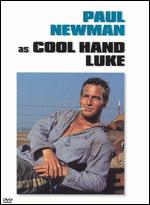 Cool Hand Luke
Cool Hand LukePN1997 .C664 1997
Paul Newman created one of the most indelible anti-authoritarian heroes in movie history with his dynamic portrayal of the title character in 1967's Cool Hand Luke. It's some of the best work of Newman's career, and he's ably backed by the excellent Strother Martin — whose "What we've got here is a failure to communicate" speech took on a life of its own in popular culture — and George Kennedy, who won an Oscar for the role of Dragline. Luke creates a rich portrait of prison life and the people on both sides of the corrections department. Co-writer Donn Pearce spent time on a chain gang for safe-cracking, and the work has an unmistakable authenticity. The story is ultimately about the senseless righteousness of authority, and about Luke, a man who manages to win even when he loses. The film would usher in a wave of unconventional heroes, from Bonnie and Clyde that same year to Jack Nicholson's McMurphy in 1975's One Flew over the Cuckoo's Nest. ~Mark Deming, All Movie Guide
Watch the trailer:
Watch George Kennedy describe filming his big fight scene with Paul Newman
0 Comments:
Post a Comment
<< Home